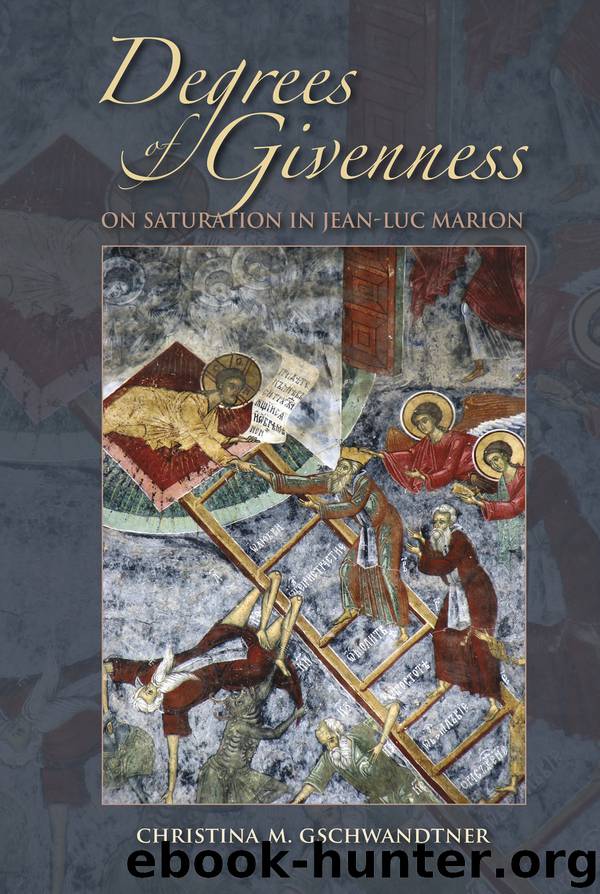Degrees of Givenness by Gschwandtner Christina M

Author:Gschwandtner, Christina M.
Language: eng
Format: epub
Publisher: Indiana University Press
Published: 2013-12-31T16:00:00+00:00
The Excess of the Gift
The gift has become the very paradigm of the impossible in phenomenology. The excessive depiction of the gift is certainly not particular to Marion. Jacques Derrida, John D. Caputo, Edith Wyschogrod, and any number of other interpreters speak of the gift in such superlative and excessive terms. Pure gratuity belongs to the very definition of the gift. Yet pure gratuity is never possible in our concrete human situations. Thus, the gift, as such a pure giving, becomes impossible. In Derrida’s account of forgiveness and sacrifice, by which Marion is influenced here and to which he responds even when he does not cite Derrida explicitly, this purity and contamination continually cross each other. Derrida does not give up on the purity of the gift, and it is surely as excessive as Marion’s account, even if Derrida does not identify it as a saturated phenomenon or even as a phenomenon at all. For Derrida, the gift and forgiveness are “the impossible.” Forgiveness is only truly forgiveness when it forgives the unforgivable. The gift is only truly given when it is so pure that it disappears as a gift entirely.
And yet Derrida recognizes that this purity, although it is essential and undergirds any idea of gift giving or forgiveness, is never actually enacted in real life. Our gifts are always contaminated by exchange, our forgiveness always marred by debt. This is necessarily so and cannot be otherwise. Although this contamination and debt must be continually criticized, this does not mean that they will ever go away or that we might actually be able to accomplish an instance of purity. Derrida claims that a purely gratuitous gift is “impossible,” that no real gift can ultimately be given. This is so in a necessary and structural way: the very notion of the gift implies its pure gratuity, its free nature that is not tied to any notion of exchange or reciprocity and not contaminated by any expectation of response or even gratitude. Yet, as Derrida points out repeatedly and as we know from intimate experience, no such completely pure, gratuitous gift ever occurs. Our gifts are always impure and fall short of absolute gratuity. For Derrida, the gift functions as an ideal, as a structural limit case that gets us continually to reexamine our assumptions and transactions, to discover and even highlight their impurity, and always to explore opportunities in which we would be more deliberate, more aware, and more just in our transactions, while keeping the structural impossibility of the ideal as a continual criticism and impetus for the concrete, less ideal and more contaminated instantiations. This is not merely a resigned acknowledgment that we will never reach some impossible ideal, but the impossible itself—whether gift, forgiveness, messianism, the democracy to come or hospitality—are structurally involved in all the less ideal instantiations. The very notion of “gift” requires the “impossible” and unreachable ideal of purity and gratuity, the very notion of forgiveness relies upon the impossible of the unforgiveable that
Download
This site does not store any files on its server. We only index and link to content provided by other sites. Please contact the content providers to delete copyright contents if any and email us, we'll remove relevant links or contents immediately.
The remains of the day by Kazuo Ishiguro(8968)
Tools of Titans by Timothy Ferriss(8362)
Giovanni's Room by James Baldwin(7318)
The Black Swan by Nassim Nicholas Taleb(7102)
Inner Engineering: A Yogi's Guide to Joy by Sadhguru(6785)
The Way of Zen by Alan W. Watts(6594)
Asking the Right Questions: A Guide to Critical Thinking by M. Neil Browne & Stuart M. Keeley(5752)
The Power of Now: A Guide to Spiritual Enlightenment by Eckhart Tolle(5744)
The Six Wives Of Henry VIII (WOMEN IN HISTORY) by Fraser Antonia(5494)
Astrophysics for People in a Hurry by Neil DeGrasse Tyson(5174)
Housekeeping by Marilynne Robinson(4434)
12 Rules for Life by Jordan B. Peterson(4299)
Double Down (Diary of a Wimpy Kid Book 11) by Jeff Kinney(4257)
The Ethical Slut by Janet W. Hardy(4240)
Ikigai by Héctor García & Francesc Miralles(4236)
Skin in the Game by Nassim Nicholas Taleb(4235)
The Art of Happiness by The Dalai Lama(4120)
Skin in the Game: Hidden Asymmetries in Daily Life by Nassim Nicholas Taleb(3987)
Walking by Henry David Thoreau(3950)
